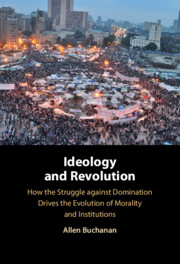 Ideology and Revolution
Ideology and Revolution Book contents
- Ideology and Revolution
- Ideology and Revolution
- Copyright page
- Contents
- Preface
- Acknowledgments
- Introduction
- Chapter 1 The Structure and Recurring Patterns of the Perpetual Struggle against Domination
- Chapter 2 Revolution and the Explanatory Power of the Concept of Ideology
- Chapter 3 Ideology and the Authoritarian Tendency of Revolutions
- Chapter 4 The Ethics of Revolution and Intervention in Revolution
- Chapter 5 Findings and Suggestions for Further Research
- References
- Index
Chapter 3 - Ideology and the Authoritarian Tendency of Revolutions
Published online by Cambridge University Press: 13 March 2025
- Ideology and Revolution
- Ideology and Revolution
- Copyright page
- Contents
- Preface
- Acknowledgments
- Introduction
- Chapter 1 The Structure and Recurring Patterns of the Perpetual Struggle against Domination
- Chapter 2 Revolution and the Explanatory Power of the Concept of Ideology
- Chapter 3 Ideology and the Authoritarian Tendency of Revolutions
- Chapter 4 The Ethics of Revolution and Intervention in Revolution
- Chapter 5 Findings and Suggestions for Further Research
- References
- Index
Summary
This chapter explains the tendency of revolutions to produce new forms of oppression rather than genuine liberation. It distinguished between Lockean and Hobbesian revolutionary conditions. In the former, the aspiring revolutionary leadership has institutional resources for solving the participation problem (how to get enough people to join the revolution) and the coordination problem (how to organize participation). Because they have access to relevant institutions and experience in operating within them, the aspiring revolutionary leadership can solve the participation and coordination problems in a relatively peaceful, noncoercive, consensual manner. In contrast, in Hobbesian conditions, where they lack access to institutions, the aspiring revolutionary leadership will typically have to resort to coercion to solve the participation and coordination problems. A particular kind of revolutionary ideology can help them achieve coercive solutions to those two problems. The features of this type of ideology that encourage coercive solutions to the participation and coordination problems are (1) framing the struggle against the regime as a Manichean contest between good and evil, a zero-sum, winner-take-all battle where the only options are victory or annihilation, (2) extreme deference to those the ideology identifies as the true leaders of the revolution, and (3) reliance on conspiracy theories that explain away failures of the leadership or other setbacks to the revolution. I then go on to identify the factors which, combined with reliance on this type of revolutionary ideology, make it highly likely that the new regime will be authoritarian, violent, and oppressive.
Keywords
- Type
- Chapter
- Information
- Ideology and RevolutionHow the Struggle against Domination Drives the Evolution of Morality and Institutions, pp. 142 - 174Publisher: Cambridge University PressPrint publication year: 2025
